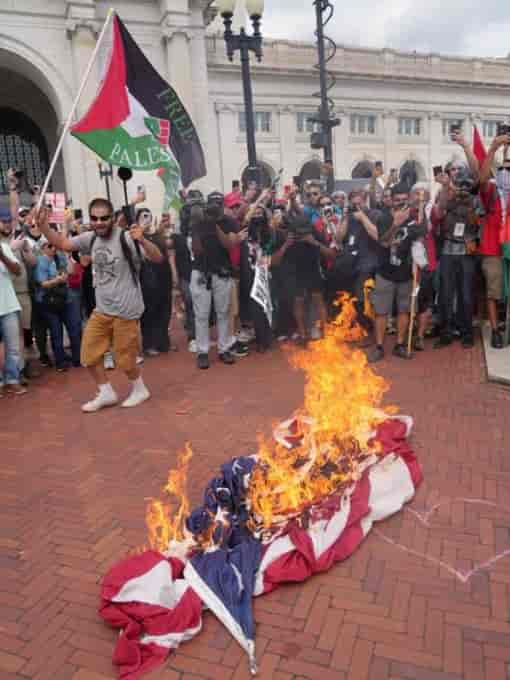Israel-Gaza War, U.S. Protests
Capital Chaos: US Flag burns as Netanyahu visit sparks fiery DC showdown
American flags burned, monuments defaced as protestors clash with police during Israeli PM's visit. White House condemns 'disgraceful' actions as cleanup begins in nation's capital.


As Prime Minister Benjamin Netanyahu addressed Congress on Wednesday, the streets of Washington, D.C. erupted in a chaotic spectacle: What began as a protest quickly devolved into scenes of vandalism, violence, and virulent anti-Israel sentiment, leaving the nation's capital reeling and law enforcement scrambling to maintain order.



At Union Station, the epicenter of the turmoil, protesters reportedly set fire to an American flag – a provocative act that sent shockwaves through onlookers. Nearby, a statue stood defaced, bearing witness to the raw emotions of the day. In a symbolic gesture, demonstrators were seen replacing American flags with Palestinian ones, their chants echoing off the historic buildings.
Law enforcement agencies scrambled to respond to the escalating situation. The United States Park Police, Metropolitan Police Department, and Capitol Police found themselves in a tense standoff with protesters. By day's end, 23 individuals were in custody, facing charges ranging from assault on a police officer to crossing police lines.
Columbus Circle, usually a tranquil space, became a flashpoint of confrontation. Statues and fountains fell victim to vandals, while small fires flickered ominously. As authorities revoked the event permit and ordered the area cleared, their commands competed with the clamor of the crowd.
The White House swiftly condemned the actions. Deputy Press Secretary Andrew Bates didn't mince words, declaring, "Antisemitism and violence are never acceptable," and labeling the day's events as "disgraceful."
National Park Service conservators now begin the painstaking process of restoring damaged monuments, while community leaders grapple with the deeper implications of the day's events.
Washington, D.C. now stands at a crossroads, forced to confront difficult questions about the balance between free speech and public safety, and the complex ways in which global conflicts play out on American soil.
* Jewish World News contributed to this article.
Join our newsletter to receive updates on new articles and exclusive content.
We respect your privacy and will never share your information.
Stay Connected With Us
Follow our social channels for breaking news, exclusive content, and real-time updates.
WhatsApp Updates
Join our news group
Follow on X (Twitter)
@JFeedIsraelNews
Follow on Instagram
@jfeednews
Never miss a story - follow us on your preferred platform!